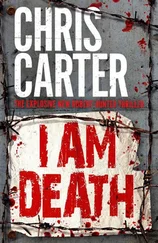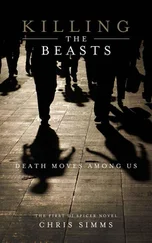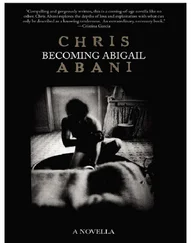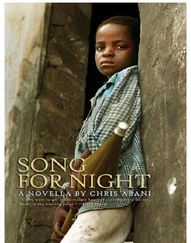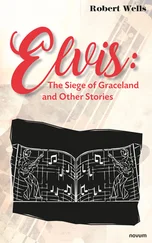“What’s matter, eh? What’s matter?” he mumbled, staring vacantly into the bright light.
“Sunday, you stand so? Why not help me pack before bu’dozer come knock our house down?”
“What’s matter? Which bulldozer? Are you mad?”
“De gofment send anoder bu’dozer,” she said, dropping another bag on the ground and going back for more.
“De government can go to hell!” he yelled. “I want to sleep.”
Comfort elbowed him aside and stooped to lift the stuff she had salvaged onto her head. Thank goodness the children were staying with relatives, she thought. She didn’t think she would have managed with them here.
“If you want to die, go and sleep. If not, help me carry something and let us go!” she shouted at him.
“Go where?”
He tried to focus.
“Look, Papa Elvis, bu’dozer is come. Me, I have carry my gold and expensive lappa and I no fit to carry more. Let’s go,” she said urgently as the rumbling grew louder.
A few streets away, clouds of dust and sprays of water rose as the dozers leveled everything in their path — houses, shanties, even the swamps.
“Go where?” he asked again.
She took one more look at the approaching bulldozer, stepped into the street and was swallowed by the crowd. He looked for her, but she was lost somewhere in the sea of bodies flowing past him.
“Go where?” he muttered to himself under his breath. “Dis is my land. I buy dis house, it is not dash to me. Why I go?”
The dozers rolled uncomfortably closer. The vibrations from them shook the windowpanes, dislodging a few, which fell, shattering noisily. The lights cut through the sky and the night was bright, and still Sunday stood on his veranda smiling enigmatically. A few yards away a house built of corrugated iron and cardboard crumbled with an exhausted puff, while the old generator in another exploded.
Sunday became aware of another presence on the veranda. Turning quickly, he gasped when he saw Beatrice reclining on the bench. She noted the shocked look on his face and spoke.
“Sunday, don’t be afraid.”
“Why not? You’re a ghost. Have you come to kill me?”
Beatrice smiled sweetly, and something about that smile sent shivers down his spine.
“No, I came to warn you to leave.”
“And if I don’t?”
“Den you will die.”
He turned away from her. If he ignored her, she would disappear. She was, after all, a drunken hallucination. He laughed. Madam Caro must have laced his palm wine with some narcotic. Whatever it was, it was good, and he was glad he was a regular.
“Sunday.”
He turned back to where Beatrice had been sitting. She was still there, but there was another presence too.
“You’re not really here,” he told her.
“Oh yes I am — and so is he,” she said, pointing to a leopard curled up in the shadows.
“What is dis? Did you bring a spirit leopard to kill me?”
“No. He is here on his own.”
“But what is dis?”
“I am the totem of your forefathers.”
Sunday blinked. A talking leopard, his wife’s ghost, the bulldozers: it was too much.
He turned back to the scene unfolding in front of him and saw policemen and soldiers driving people off with gun butts and leather whips. “Get out! Go! Go!” they yelled. In the distance a mother stopped in mid-flight, remembering her son trapped in her hut. She ran back for him. “Hassan! Hassan!” she screamed. The butt of a rifle chased her screams down her throat with a mouthful of teeth and blood. She crumbled to the ground and the soldier kicked her aside.
“You are going to die here, you know, unless you get out,” the leopard said.
“He’s not joking. Listen, Sunday, you still have a son to care for. Leave,” Beatrice said.
Sunday was getting worried. If Beatrice and the leopard were only hallucinations, why had they remained even when he wasn’t paying any attention?
“You are de one who will die!” he shouted.
“I am already dead,” Beatrice said. “And I think de leopard is a spirit.”
“You disappoint me, Beatrice, eh. Why must you mock me?”
Beatrice’s ghost looked hurt, her lips trembling.
“I came to you in your time of need, but if you like, I can leave.”
Sunday shouted and punched himself around the face.
“In the old days, people were close to their totems, who infused them with their own special attributes, both physical and metaphysical. Lycanthropy was not unusual in those days when the ancient laws were kept,” the leopard said.
“Go and tell your story elsewhere,” Sunday interrupted. “If you are person or spirit, I don’t know and don’t care. Both of you just leave me alone, dat’s all.”
The ’dozers were only a few yards away and policemen and soldiers were running past his house. One of the policemen spotted him slouched on his veranda in only a loincloth, looking for all intents like a man basking in the noonday sun.
“You dere!” the policeman barked.
“He has seen you. Won’t you go, or do you want to die?” the leopard asked.
“Think of Elvis,” Beatrice said.
“You dere, go now before I vex!” the policeman yelled again.
“This is the hour of your death. Go out and fight for your honor.”
“You deaf? I say move before I move you!” the policeman yelled again, advancing on Sunday, and cocking his rifle.
“Well, at least die like a man,” the leopard said with a bored yawn.
Beatrice, already fading into the shadows, watched tearfully as the ‘dozers approached. They were almost upon him and the vibrations were coming from everywhere. Grabbing a cutlass Comfort had dropped earlier, Sunday sprang with a roar at the ’dozer. The policeman let off a shout and a shot, and Sunday fell in a slump before the ’dozer, its metal threads cracking his chest like a timber box as it went straight into the wall of his home. Sunday roared, leapt out of his body and charged at the back of the policeman, his paw delivering a fatal blow to the back of the policeman’s head. With a rasping cough, Sunday disappeared into the night.
Elvis was halfway through his act when Freedom Square erupted. Soldiers spilled out of trucks flooding the area. There was a stampede. People, food, furniture — everything was trampled underfoot. The soldiers laid into everyone with tough cowhide whips, wooden batons and rifle butts, and the air was heavy with screams and shouts. As far as they were concerned, the audience was as guilty as the performers.
“My head O!”
“Yee!”
“Move!”
“Stop or I’ll shoot!”
“Bastard!”
Elvis, completely confused, was unsure how to react, not fully comprehending what was happening. He felt someone yanking at his arm. He turned. It was the King of the Beggars. He was yelling at him, but Elvis couldn’t hear any sound. The King slapped him hard.
“We get to go now,” he said while hurrying Elvis off the stage. They ducked behind an army lorry and headed for the edge of the square and the streets that snaked off it into the dark maw of the city. They had almost made it when a soldier stepped out of nowhere. He loomed large and dark, blocking off the light. Elvis saw the King disappear into the distance.
“Identify yourself!” the soldier barked.
“I … I …”
“Bloody civilians,” the soldier said, bringing his rifle butt down on the side of Elvis’s head with a resounding crack. From a great distance Elvis heard the soldier call for help to lift him into the back of a lorry.
Elvis hung from the metal bars on the window, feet dangling six inches from the floor, suspended by handcuffs. The pain was excruciating, building up in slow stages, getting worse with each passing minute.
Читать дальше

